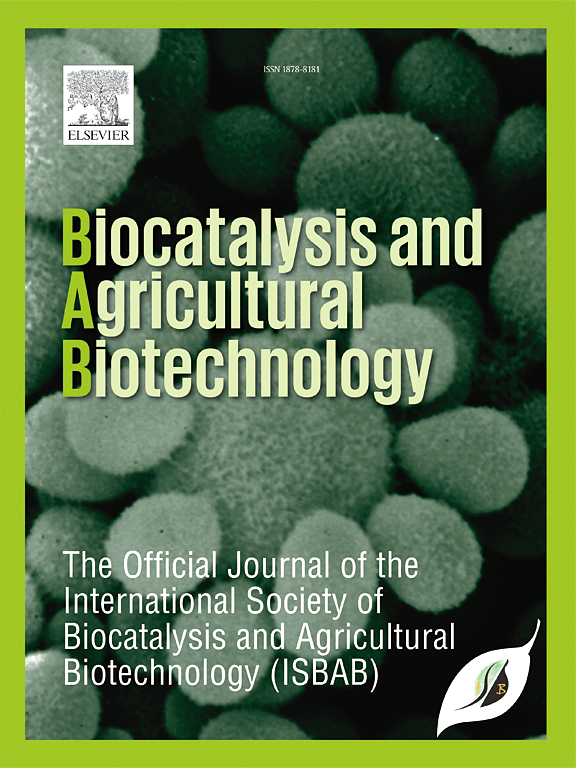Green kitchen waste synthesized iron nanoparticles: Antifungal activity and growth promotion in tomato plants
IF 3.4
Q2 BIOTECHNOLOGY & APPLIED MICROBIOLOGY
引用次数: 0
Abstract
The menace of early blight disease, caused by Alternaria solani, threatens tomato cultivation, necessitating eco-friendly alternatives to chemical fungicides. This study explores iron nanoparticles synthesized from kitchen waste (KW-FeNPs) at various concentrations (1000-125 ppm) for enhancing tomato growth and disease resistance. Building upon a prior investigation into the growth-promoting potential of these FeNPs in Vigna radiata seedlings and plantlets, our present in vitro analyses revealed impressively low minimum inhibitory (MIC) of KW-FeNPs at 125 ppm and fungicidal concentration (MFC) at 500 ppm, with strong inhibition of A. solani spore germination. KW-FeNPs treatment increased salicylic acid levels (1.986 ± 0.001 μg/ml), enhancing plant defense. The in vivo studies showed a substantial increase in root and shoot length which became evident on the 14th day (3 ± 0.08 cm and 4.13 ± 0.08 cm, respectively), particularly at a concentration of 125 ppm of KW-FeNPs, alongside enhanced chlorophyll content. The SEM analysis showed fungal morphological disruptions, confirming antifungal activity. These findings highlight KW-FeNPs as a sustainable alternative for managing early blight while reducing agriculture's ecological impact.

绿色厨房垃圾合成铁纳米颗粒:抗真菌活性和促进番茄植株生长
由番茄赤霉引起的早疫病威胁到番茄种植,因此需要采用环保的化学杀菌剂替代品。本研究探讨了从厨余垃圾中合成的铁纳米颗粒(KW-FeNPs)在不同浓度(1000-125 ppm)下促进番茄生长和抗病性的作用。基于之前对这些FeNPs在紫穗槐幼苗和植株中促进生长潜力的研究,我们目前的体外分析显示,在125 ppm和500 ppm时,KW-FeNPs的最低抑制(MIC)和杀真菌浓度(MFC)令人印象深刻,对茄茄孢子萌发有很强的抑制作用。KW-FeNPs处理提高水杨酸水平(1.986±0.001 μg/ml),增强植物防御能力。体内研究表明,在第14天,根和芽的长度明显增加(分别为3±0.08 cm和4.13±0.08 cm),特别是在125 ppm的KW-FeNPs浓度下,叶绿素含量增加。扫描电镜分析显示真菌形态破坏,证实抗真菌活性。这些发现强调了KW-FeNPs是一种可持续的替代方案,可以在减少农业生态影响的同时管理早疫病。
本文章由计算机程序翻译,如有差异,请以英文原文为准。
求助全文
约1分钟内获得全文
求助全文
来源期刊

Biocatalysis and agricultural biotechnology
Agricultural and Biological Sciences-Agronomy and Crop Science
CiteScore
7.70
自引率
2.50%
发文量
308
审稿时长
48 days
期刊介绍:
Biocatalysis and Agricultural Biotechnology is the official journal of the International Society of Biocatalysis and Agricultural Biotechnology (ISBAB). The journal publishes high quality articles especially in the science and technology of biocatalysis, bioprocesses, agricultural biotechnology, biomedical biotechnology, and, if appropriate, from other related areas of biotechnology. The journal will publish peer-reviewed basic and applied research papers, authoritative reviews, and feature articles. The scope of the journal encompasses the research, industrial, and commercial aspects of biotechnology, including the areas of: biocatalysis; bioprocesses; food and agriculture; genetic engineering; molecular biology; healthcare and pharmaceuticals; biofuels; genomics; nanotechnology; environment and biodiversity; and bioremediation.
 求助内容:
求助内容: 应助结果提醒方式:
应助结果提醒方式:


